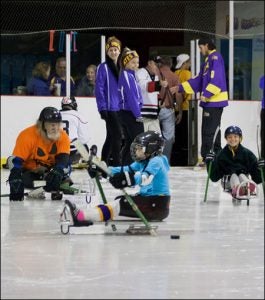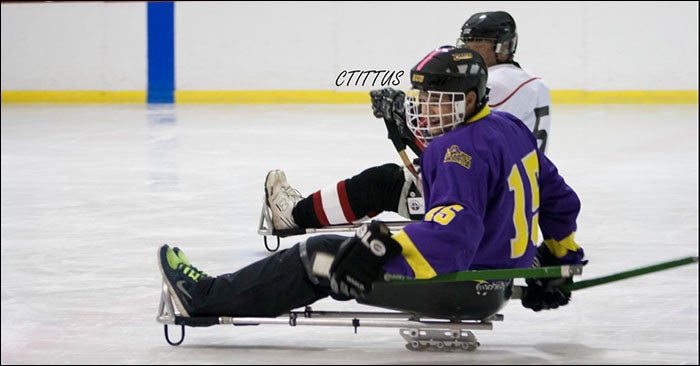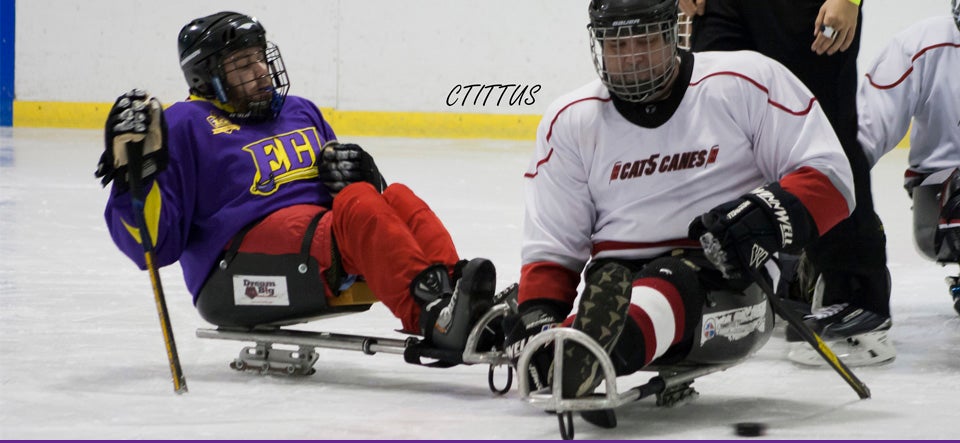ON THE ICE
ECU hosts sled hockey clinic for individuals with disabilities
Black Jack resident William Hulslander tried sled hockey at a clinic hosted by East Carolina University and liked it so much that he ended up joining a team.
Hulslander, who lost both legs in an accident, took part in ECU’s fall adapted sports clinic held Oct. 18 at Bladez on Ice in Greenville.
The day helped bring awareness to recreational opportunities for individuals with disabilities.
Hulslander joined the Cat5 Canes sled hockey team from Raleigh, which played ECU’s club hockey team in an exhibition game before the clinic. The Cat5 Canes are sponsored by the NHL’s Carolina Hurricanes.

William Hulslander, far left wearing orange, warms up for a game of sled hockey.
Sled hockey, a Paralympic sport, is physically demanding because movement on the sled is totally dependent on the upper body. Players propel themselves by use of spikes on the ends of two three-foot-long sticks.
Core balance and strength are necessary to excel, said Dr. David Loy, ECU associate professor of recreational therapy and graduate program director in the College of Health and Human Performance.
Hulslander, 51, had watched sled hockey in the Paralympic Games and wanted to give it a try. “I didn’t even know ECU had a hockey team,” he said. “I enjoyed it. I got to try it out and block a puck or two.”
A U.S. Marine Corps veteran, Hulslander has lived in the area since leaving military service in 1985. He was hurt in an industrial accident in 1999 after a lift fell on him at work. Trapped for more than five hours, he lost circulation in both legs, which led to his double amputation.
Originally from Minnesota, he left winter sports behind after moving to North Carolina. “I played a little hockey when I was young, but I haven’t been on the ice in 35 years,” he said.
Events like the sled hockey clinic help introduce different sports to keep people with disabilities healthy and active, and provide valuable opportunities for ECU students.
“Our community is a classroom and (having the event) supports ECU’s mission of serving our community and providing our students an opportunity to learn about the sport of sled hockey, adapted sport equipment and how to build these types of sport programs in other communities,” Loy said.

While providing an opportunity for individuals with disabilities to learn about sled hockey, the adapted sports clinic at ECU also gave ECU students in fields such as physical therapy a chance to learn techniques they can apply in their careers.
Meredith Hayek, a doctoral student in physical therapy and graduate research assistant in the Human Movement Lab, was one of five graduate students who served on the planning committee for the event. The clinic presented a practical, real-world situation for students, she said.
Helping patients get from a wheelchair or land into the sled and on the ice requires proper body mechanics to ensure therapist and patient safety.
Therapists motivate patients to do as much as possible so they use their muscles and abilities, said Hayek, who is from Hickory. She earned a bachelor’s degree in exercise physiology from ECU in 2013.
“As I look toward treating patients in the future, if I had a patient interested in sled hockey, I could use that as an exercise to improve their core strength, arm strength and balance,” Hayek said. “To stay upright in the sled, one must have good core stability and balance. This is especially important in turning.”
Hayek said sled hockey would be a fun way to improve a patient’s physical fitness and observe their limits of stability if an ice facility and equipment were available. She could incorporate exercises into a land-based program if no facility or equipment was available, she said.
“This is the first time we’ve offered this sport in our ECU community,” Loy said. “We continually look for unique sport and recreational opportunities to bring to our community to make others aware of the endless possibilities for individuals with disabilities. This is by far, in my opinion, the most unique sport we’ve included in our events.”
ECU’s departments of recreation and leisure studies and physical therapy collaborated with Support Team for Active Recreation, Vidant Medical Center and the Vidant Medical Center Foundation to host the clinic.
